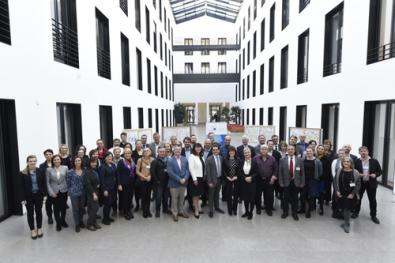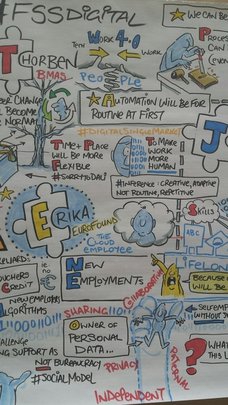NIALL SHANAHAN, IMPACT’s Communications Officer, attended the European Foundation’s seminar series on the digitalisation of work in Berlin. He was there, representing ICTU as part of the Irish Tripartite team, to provide a trade union perspective on the changing nature of work. This blog, compiled from his joint submission to the Foundation as well as a recent Work & Life article by LUGHAN DEANE entitled ‘The Future of Work - Sharing the Load’ explores some of the challenges that the sharing economy poses for trade unions. 
It’s only when the capitalist system is pushed to within an inch of its life and its bloated financial institutions are stripped back by crisis that the system’s underlying lean, muscular dynamism is revealed. Its post-2008 reaction to the west’s tentative flirtations with alternative systems of social organization provided a perfect illustration of its original appeal. Rather than struggling against the socialist rhetoric of movements like Occupy, the capitalist system incorporated it. It commodified the dissent that existed against it. It brought opposing forces into its own logical framework. It allowed a little of its enemy in. In other words, it inoculated itself against the potential for a real attack.
The result of this process of self-inoculation is the so-called sharing economy, the most recent frontier of modern capitalism. In developing the sharing economy, the capitalist system hit upon an adaptation that resolved the three great risks to its survival as brought about by the 2008 financial crisis. At once it inoculated itself against growing left-wing dissent with its emphasis on ‘sharing’ and ‘community’, it invented platform-based busy-work to occupy the armies of newly unemployed workers and it found a way to re-commodify all the excess product that had been accumulated by consumers during nearly two decades of economic boom just as consumption ground to a halt.
The real genius of the sharing economy is that it commodifies the aesthetic of socialism without ever coming close to adopting the system. By re-appropriating the left-wing rhetoric of the trade union or cooperative, the sharing economy at once neutralises the threat of alternative worldviews and advances its own brand of aggressive, dynamic capitalism.
The digitalisation of work and the evolution of a (global) digital economy create specific challenges and opportunities in terms of industrial relations and legislation. The employer / employee relationship is changing. Platform work means workers from countries with high levels of social protection are brought into competition with those from countries with low levels of protection.
From a trade union perspective, the potential for these platforms to radically reorganise labour markets is a concern. It raises questions about the potential casualisation of work as platform workers are forced to bid for work and establish themselves as self-employed; the potential for ‘invisible’ outsourcing of work to third parties and; the potential to create a new ‘black economy’; the transfer of all risk and costs from employer to employee; the loss of standard provisions for social security and the absence of collectively bargained terms and conditions.
Traditional unions as they are currently configured will struggle to operate in the context of the sharing economy. On the one hand, people act as independent micro-entrepreneurs in competition with one another and so are disincentivized from organising. While, on the other, private contractors who do organize to agree on acceptable terms and conditions of employment could be accused of price fixing and forming an illegal cartel. For these reasons, many have seen the sharing economy as an attempt (polished by slick PR) to bypass a body of employment and workplace law that has been built up over decades.
Platform work has the potential to unravel decades of worker protections fought for by trade unions and delivered, in more recent times, by the EU.
 In the world of precarious employment, the virtues of ‘flexibility’ are underwritten by low pay, high pressure and a backdrop of uncertainty, all borne by the worker providing the service. If the digital platforms are to become a more fully integrated employment option, then the principle of quality employment - a decent wage, occupational health and safety provision, acceptable working conditions, opportunities for training and promotion; and standardised and transparent employment contracts - must apply.
In the world of precarious employment, the virtues of ‘flexibility’ are underwritten by low pay, high pressure and a backdrop of uncertainty, all borne by the worker providing the service. If the digital platforms are to become a more fully integrated employment option, then the principle of quality employment - a decent wage, occupational health and safety provision, acceptable working conditions, opportunities for training and promotion; and standardised and transparent employment contracts - must apply.
The challenge for trade unions is to develop a deeper understanding of the emerging forms of work, and to position themselves to become a resource for the workers engaged in these employments.
Trade unions provided the very first form of networking between workers and the trade union movement has successfully navigated workers through other phases of radical transformation and evolutions in the modern workplace. We are at a point where we need to be able to continue that process in an environment that is changing more rapidly than ever before.
Renting is not and can never be sharing. The good news is that there is a real, functioning sharing economy already in existence - it’s called the public sector. A public library, a park, or a swimming pool are all examples of an actual collaborative economy. Through taxes we pool resources and invest in services that we all get to use - a true sharing economy.